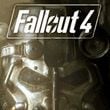Fallout 4 Review – Apocalypse Now
Fallout 4 is probably one of the most anticipated games in recent years. Due to the history of the series, the expectations for this title were really high... Has the game managed to satisfy the gamers?
The review is based on the PC version. It's also relevant to PS4, XONE version(s).
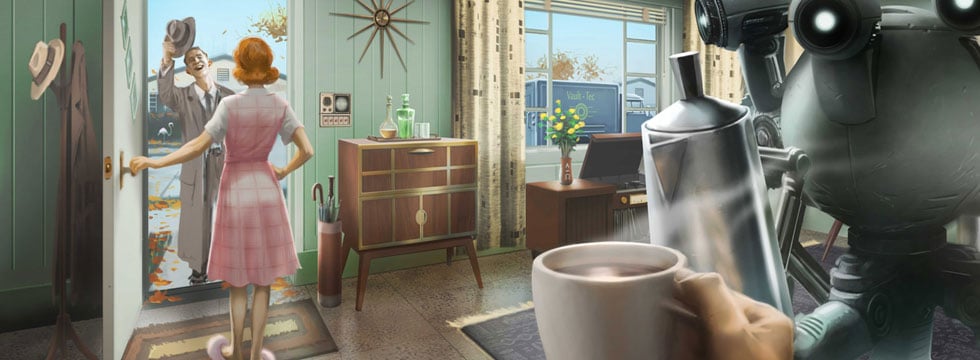
- Great character creation tool;
- Slightly smaller than expected, but still a huge world to explore;
- Esthetically pleasing locations make us want to delve right in;
- Climatic music and sound;
- Plenty of side quests to complete and stuff to find;
- A decent shooting model and interestingly modified VATS system;
- Well-executed Power Armor mechanics;
- The system of crafting and settlement construction takes a lot of time and is deeply satisfying;
- The main storyline and side quests have their moments...
- ... but most of the time they are cliché and terribly shallow;
- A record number of glitches;
- Image frame-rate problems;
- Extremely oversimplified dialogue system;
- Shallow character development;
- "Too much shooting, not enough talking";
- Completely unintuitive interface;
- The world around us seldom stirs up any emotion;
- Animations and some textures are stuck in the Stone Age.
It's basically impossible to point out a more anticipated game in the last few years. The announcement of Fallout 4 made many people euphoric, while others grew concerned; regardless of the attitude, the game was on everyone's lips. After acquiring full rights to the franchise, Bethesda made this post-apocalyptic world one of the most recognizable universes in video games. And although the developers are to blame for a great many things, if it weren't for them we'd probably never set foot in a vault again. The revised formula introduced in Fallout 3 wasn't to everyone's liking, but a moment later we received New Vegas, which reignited the hope that a "classic, story-oriented Fallout" was still possible. And this hope some people transferred onto the fourth part. Throughout the whole series I spent several hundred hours in the Fallout universe (and, paradoxically, it’s not the third part or its expansion at the top of this ranking), so I dare say I have a pretty decent understanding of the topic. And honestly? When Fallout 4 was announced I was terrified of what was to come. I was afraid watching the first and subsequent trailers. I was afraid when I installed the game. I was afraid when I started playing... and I was afraid when I finished. In the latter case, however, the fear was due to totally different reasons than it was in the beginning. Reasons that took me by surprise and which I'll explain later in this article.
A story almost different than usual
We start the adventure in Fallout 4 as befits a true Fallout – by creating our character. First, a short, relatively climatic intro sets the right mood, and then we are shown our hero – or heroine. The protagonist is standing in front of a bathroom mirror, and we have the ability to model his or her appearance in a very detailed manner. Already at this point one can see that the creation tool is simply amazing. By dragging individual parts of the face, we are able to create virtually any character. The tool works great; it’s very intuitive and allows for an infinite number of combinations, and we all know that the process of creating our own alter ego in the virtual world is one of the biggest attractions for RPG fans. Further on, we get the opportunity to select initial statistics, but due to the fact that this issue much more complex I'll tackle it later on. For now, let's focus on what happens to our hero once we "accept" his or her look.
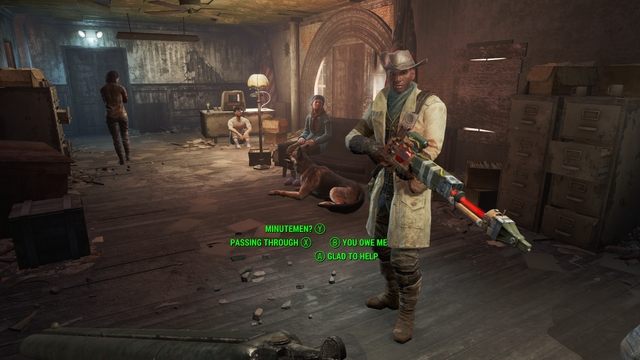
This time we don't start as a child in a vault or a descendant of a hero living in a small village; neither does anyone send us on a mission to the surface to rescue the vault's residents. In Fallout 4 the story begins just before the Great War, in the year 2077. The possibility of seeing the world before the apocalypse is a great treat – even though everything seems a tad artificial, it has its own unique charm. However, this white-picket fence life doesn't last long. Moments later, a news anchor on the TV announces the explosion of the first atomic bomb, and our protagonist, along with his or her family, rushes to a nearby vault, which luckily lets them in. However, a small surprise awaits us there – we end up in a cryogenic chamber. 210 years later we wake up from hibernation, immediately forced to face a dramatic situation – our son was kidnapped. Without further ado, the hero sets out to find the missing child.
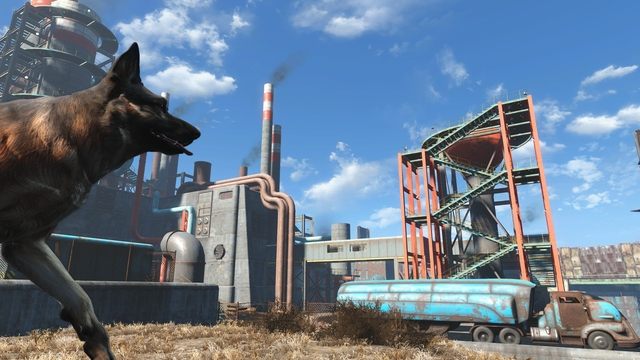
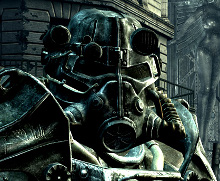
There’s a total of four factions in the game: the Brotherhood of Steel, the Minutemen, the Railroad, and the Institute. Until a certain point we can carry out missions for all of them, but sooner or later a conflict of interest arises and upon siding with one of the groups, we must eliminate at least some of the others. Meaningful choices are scarce in the game, so it's a good thing that at least in this aspect we can decide the fate of our post-apocalypse.
The beginning of the main story piqued my interest quite a bit. The pattern is perhaps somewhat reminiscent of what we know from the third game (instead of a son we were looking for our father then), but the way it was presented sucked me right in. Vault 111 is hardly one of the large ones, so after a few minutes of wandering its corridors I came to the surface, ready to be immersed in the rest of the story, but... pretty soon it occurred to me that any hopes for a gripping plot were premature. What we're given in Fallout 4 is average at best; even with a couple of unexpected twists thrown in, the first wave of excitement about the search for a missing son wanes, and the spell is broken. The story proves to be cliché and lukewarm, often featuring threads that are only loosely related and don't make much sense. There are several endings to the main arc, but the one that I experienced upon joining the ranks of the Brotherhood of Steel was probably one of the biggest disappointments in my gamer career. I don't want to spoil anything, so let me just say that “we've seen it somewhere before". And worst of all, it doesn’t feel like we managed to change anything. Someone died, something was destroyed, someone survived, and that's about it. The narrative is conducted in such a way that it is hard to empathize with our protagonist’s actions and become consumed by the events, but still... I'd be lying if I said that Fallout 4 never once managed to amaze me.
Fallout is all about exploration
I can recall at least a few moments during the forty hours spent with the game when I felt like applauding the devs. The criminal plotline in Diamond City, missions of the Silver Shroud, repair works on the USS Constitution, a visit to the Museum of Witchcraft, exploring Dunwich Borers, or following the Freedom Trail – these are examples of quests, both secondary and part of the main arc, which were constructed in an extremely interesting way, and what’s more, they feature great characters, a captivating story or an amazing location. More often than not it is the universe itself that provides the most immersive narrative and in terms of this aspect I must admit that Bethesda did its job with flying colors. The available area is not overly impressive in terms of size, but it is full of such intriguing places that one cannot simply go from point A to point B without deviating from the route several times. Perhaps we’ll come across an interesting item, a random event, or discover a new task? The map in Fallout 4 strongly encourages us to explore it, but there comes a moment eventually when we have it roughly figured out, and simply enjoying the view is longer sufficient. It would be fitting then to fill the game with some "essence". Unfortunately, this is where the authors failed all the way. The several missions mentioned above are really outstanding, but unfortunately it's just a small fraction of the quests available. The remaining tasks are painfully tedious, demanding of our protagonist to "go here and there, find this and that, and kill this guy or that creature". Unfortunately, this is what Fallout 4 boils down to, and even though we get a few gems, and the locations can be truly captivating, most of the time we are simply condemned to deal with painful mediocrity.
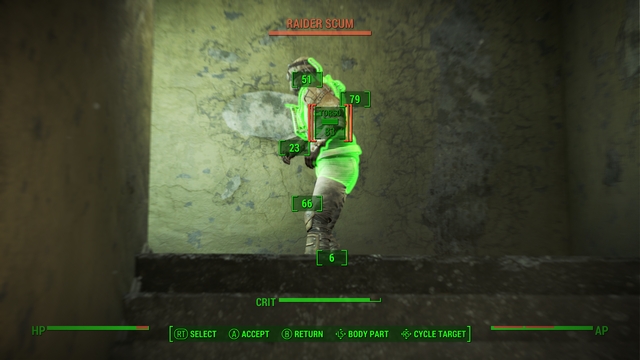
The problem with the story we're told is in large part due to the talking protagonist. For the first time in the series the creators decided to record the voices for all dialogues conducted in the game. The voice acting itself, although not outstanding, is tolerable – but this isn't where the issue lies. The thing is that, probably due to wanting to save some money, the recorded lines are just extremely simplistic and short. The layer of the game that could be expanded at will in previous installments with the use of text was replaced in Fallout 4 by its completely trivialized version. It’s best reflected in the responses available in the course of conversations. The protagonist always has only four options to choose from – these are usually (literally) "yes", "no", "sarcasm", and "I don't know". Having decided on one of them, we listen to the brief utterance after which the NPC continues his or her wooden monologue. One of the most important factors determining the quality of any RPG has been completely trivialized in this case, and subsequently it affects everything – not just the quality of the dialogue itself, but also the way we immerse in the surrounding world. There's no space at all for role-playing here, and although – as mentioned – we'll obviously find a few gems and curious conversations, for the most part we'll find ourselves participating in a "wooden puppets theater". And thanks to the animation system, we have front-row seats reserved for this poor performance.
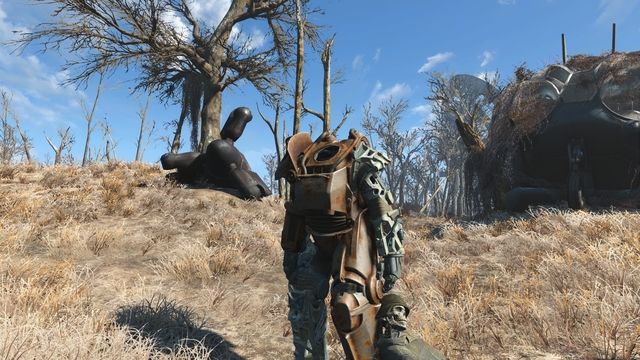
Excuse me, is this Borderlands?
Let's go back to the topic of exploration, which is the element that shines the most in Fallout 4. Interesting locations with their own story that's not told out loud are of course not all that the Commonwealth has to offer. Sooner or later, the goal of every wanderer is to find cool stuff – and there's plenty of it. Comics, books, retro games or figurines that improve our statistics are hard to find, but getting our hands on them gives us a great deal of satisfaction. Things are different with our hero’s equipment. Unlike the above-mentioned stuff, which is rather scarce, in Fallout 4 weapons, drugs and even armor abounds at every turn. This applies both to regular “garbage” as well as much better equipment. Take Fat Man for instance, previously one of the iconic weapons, which gave its owner a huge advantage in combat. This time, I came across at least a dozen of them, at various stages of the game. There's no risk of running out of ammunition either. When wandering the "latest" version of the wasteland we get a feeling that the apocalypse never really happened, and instead there's a real abundance of equipment in every corner of the Commonwealth. We get too much of everything; as a result, after only several hours of gameplay I stopped bothering to pick up even the most powerful objects. This kind of attitude would be inconceivable in the previous parts of the series.
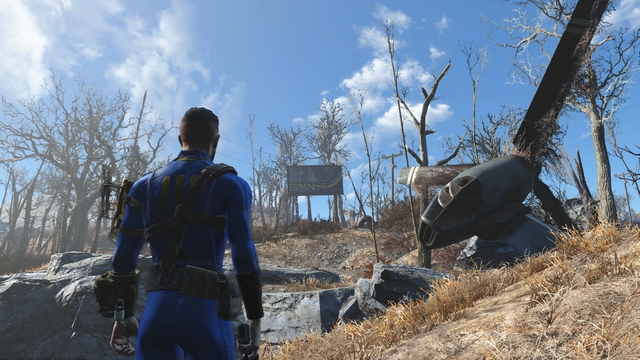
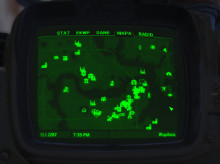
Don't let the borders visible on the map mislead you. Despite the seemingly rigid boundaries, in some places not only can we go "outside the game area", but also find some interesting sites there. Outside the map we even perform several quests, including those closely associated with the main storyline! Unfortunately, not everywhere we have so much freedom and often at some point we run into an invisible wall.
This ubiquitous prosperity is also linked to another solution which, in my opinion, kills the certain Fallout “magic”. Of course, I’m talking about the Power Armor. Acquiring it has always been a kind of culmination of our efforts, the great prize that we dreamed of when passing by members of the Brotherhood of Steel. This time we get our first suit within the initial fifty minutes. What’s more, if we play our cards right we won't have to part ways with it basically through most of the game. As if that were not enough, the multitude of pieces and skeletons of armor is jaw-dropping. While traversing the world I came across at least several pieces, some of which I brought to my 'base', but after a while I simply stopped paying attention to the rest. Still, Bethesda deserves credit for one thing – the force of the armor was amazingly depicted. The moment we enter it (it no longer replaces the ordinary armor, but acts like a vehicle) and begin to run, we can even feel a few hundred kilos heavier and almost indestructible. Of course, this power of steel had to be downgraded in some manner – the newly proposed mechanics are based on an idea that the Power Armor requires special fusion cores which are rather difficult to find at first. Frankly, it works very well and balances the gameplay appropriately, but there's no need to fret – the longer we play, the easier it is to find the "fuel". The cores abound not only in all sorts of basements, but can also be found in some of the Super Mutant lairs or simply bought from some merchants. We’ll therefore have plenty of occasions to prance around in our fancy suit of armor. If it weren't for the fact that we get our hands on the Power Armor so quickly, there would be nothing to complain about in relation to this aspect of the game.
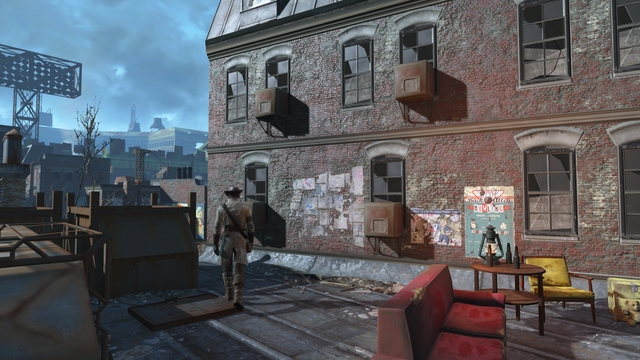
An equally interesting option seems to be the ability to upgrade the abovementioned armor. In special stations not only do we decide about the color of individual steel elements, but we can also add functionalities – even a jetpack. There’s a whole variety of combinations, but the workshop in which we construct and improve our weapons is even more impressive. The number of components that can be added or tweaked is astounding and – taking into account that the game doesn’t offer any meaningful introduction to this issue – initially overwhelming, but by trial and error we quickly get the gist of what it's all about while having loads of fun in the process. What's important, the introduced changes are actually meaningful, so this is not just art for art's sake.
Although I can’t believe that I'm going to admit it, I had a pretty good time expanding my own settlement, which is yet another new element introduced in Fallout 4. The garbage we collect while exploring can be converted into raw materials; we also recycle the immediate surroundings of the town, and when equipped with the right amount of wood, steel, concrete and electronics, we can proceed to build more shelters or fortifications. This form of entertainment is not very effective in terms of collected experience points, sometimes it may even seem repetitive, and the acquisition of the necessary elements takes a lot of time, but once I got down to building something I couldn’t force myself to leave the construction mode for a great deal of time. And all this happened despite the fact that the mechanics of constructing objects are wildly inaccurate. I can’t come up with a logical explanation, but despite all its flaws I enjoyed this particular aspect of the game very much. And since there’s such a wide variety of options when playing Bob the Builder, I'll surely spend a lot more time "mayoring" my settlements.
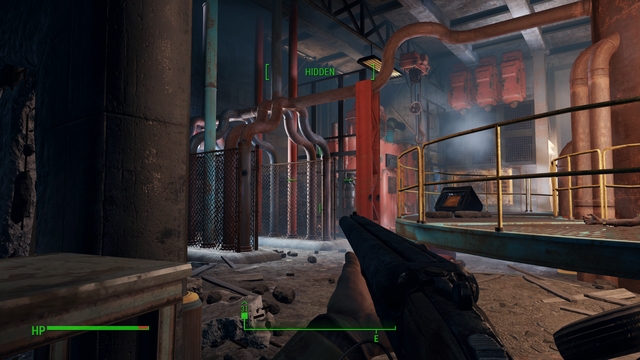
No more special treatment
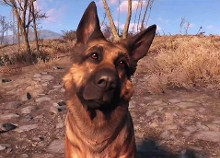
The karma system has disappeared completely from the game. Killing particular people or taking decisions during conversations no longer results in good or bad reputation. Instead, we are given a system of relations with companions. Depending on the actions we take, our allies (of whom there’s a dozen to choose from) react with approval or anger. Unfortunately, during the game I didn't notice any major consequences of this changing attitude.
While building settlements and modifying the equipment can be considered surprisingly sophisticated, the same cannot be said about the character development system. This is, unfortunately, another key element characterizing RPG games of which the new Fallout was brutally stripped. Admittedly, S.P.E.C.I.A.L. still works, but due to the new progression system it lost its significance almost entirely! From now on we can add points to the statistics with each new level (unless you choose to invest them in perks), so there's nothing stopping us from making our protagonist "Mr. Perfect" with almost ideal parameters in each category. Gone, unfortunately, are the famous "skills" that determine e.g. how well we deal with a particular type of weapon. The perks are trying to fill this gap somehow by offering different bonuses, but the way the board was designed leaves much to be desired. For starters, it's extremely illegible. Plus, the vast majority of perks has no effect whatsoever on how we play. Apart from isolated cases, such as the ability to increase the longevity of fusion cores, the benefits provided through perks are so imperceptible that most of the time I simply forgot about spending any points on them. This little celebration of every RPG fan – level-up – is of minor significance in Fallout 4. Eventually, I finished the game at level 36 and, to be honest, I didn't feel the tiniest bit more powerful than at, say, level 10.
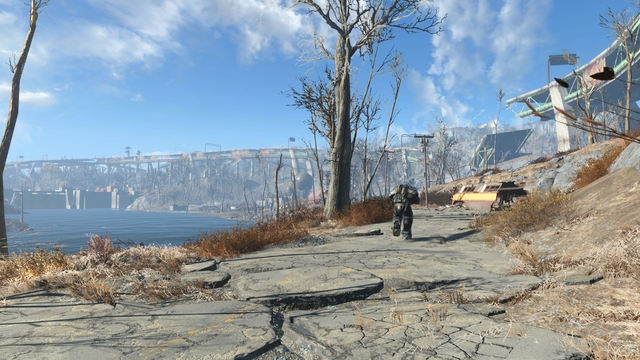
The development of the hero is not made any easier by the fact that even investing in SPECIAL is not excessively profitable. Except for unlocking various perks, high charisma or intelligence changes virtually nothing – for example, an attempt at persuasion depends on a roll of the dice anyway, and we might as well manage to convince someone to our arguments with only one point invested in this parameter, if we're in luck. All this leads to an unpleasant conclusion – no matter how well we figure out the statistics, in the end we’ll be playing in an almost identical manner anyway. Simplification of this type in a Fallout game is simply outrageous.
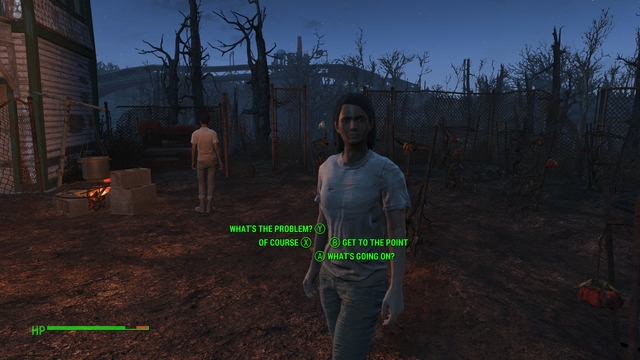
Sin in the wasteland
Since we're on the topic of outrage, it's time to tackle the subject that's been annoying the players since the premiere: graphics and bugs. As for the visuals, I have to admit that they prove to be much better in action than I expected. There are moments when the game looks terrible, but most of the time – especially out in the open and with proper lighting – the universe provides quite an enjoyable view (yes, even despite its "colorfulness"!) and I have no intention to complain too much about this aspect. Animations, on the other hand, are a totally different kettle of fish – I haven't seen characters so rigid in quite a few years, and although ghouls can display a surprising variety of jerky movements, the other characters apparently swallowed a broomstick. I'd rather not comment on the facial movements – in a game where each dialogue is shown using a film-like perspective, it's just not right to make the faces of characters look as if they were made a stone. And, unfortunately, that's the case here.
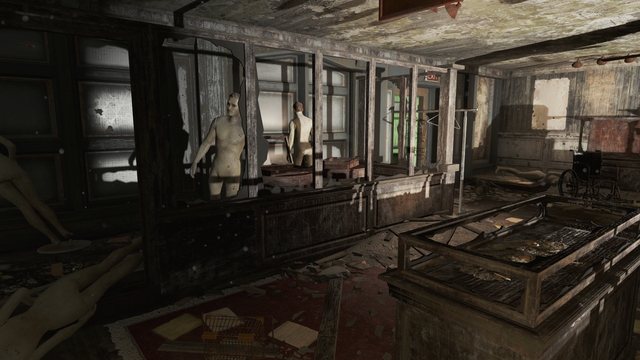
Still, I'd be willing to turn a blind eye if it weren't for bugs and glitches. Ladies and gentlemen, I would like to officially name Fallout 4 a holder of world record in this field. I probably haven't seen so many graphical errors in any other production, and although none of them belong to the game-breaking category, it’s simply impossible to ignore them. Breaking textures, overlapping silhouettes, opponents collapsing into the ground, jamming dialogue scenes, sudden unexplained deaths and resurrections of NPCs, characters talking to us with their backs turned or asleep, strange spasms of individual characters... I could go on forever, as such "small", unpolished elements are aplenty in Fallout 4. I'm not buying the argument that things like this don’t affect gameplay. For instance, let's take a look at one of the conversations with Elder Maxson of Brotherhood of Steel. The dialogue seemed to be serious, and because of my admiration for this faction I was already prepared to fully dive into its atmosphere, when suddenly... a random piece of a vertibird flied across the room. Or the synth execution scene in Diamond City, the one in which we learn of the existence of the Institute for the first time. How can I take it seriously when a few centimeters above the heads of the characters three birds are stuck, hopelessly flapping their wings in place? Funny? Maybe so, but from my perspective such things completely destroy the immersion, which is of key importance in every RPG. There’s also the frame-rate problem – most of the time the game runs smoothly, but in some locations, for unknown reasons, the number of frames suddenly drops to zero for a few seconds, and we are forced to watch a slide show. My observations show that this only applies to particular places (and not even the most "complex" ones), but such things simply shouldn’t happen.
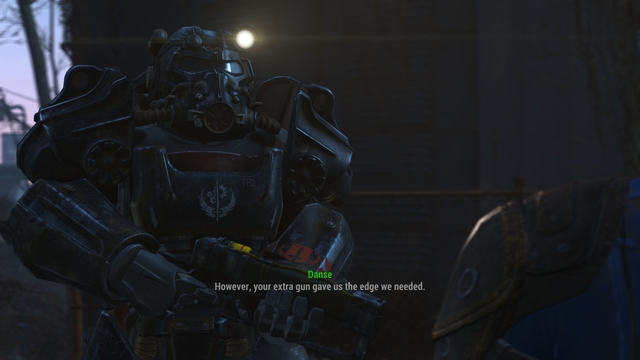
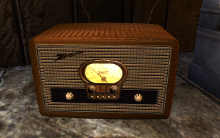
The music in Fallout 4 deserves a separate mention – it is simply amazing. The creators chose very atmospheric compositions (some from previous installments, but it's not really a problem), which are particularly noticeable during radio sessions. A cool solution, and also a big change, comes in the form of DJ who runs the Diamond City radio – he is the absolute opposite of Three Dog from Fallout 3: he speaks hesitantly, gets confused... but it all sounds very good, and thanks to this solution the game gains authenticity. Add to this the immensely entertaining radio dramas, such as the adventures of the Silver Shroud, which I could listen to an end. Aside from the music, the sounds the weapons and enemies make are very pleasing as well – this aspect definitely deserves praise.
I must grumble a bit about another important aspect – the interface. The version that Bethesda gave us in Fallout 4 is simply terrible. Most of the time I played with mouse and keyboard, and believe me – if you don't have a third hand at the ready, you'll curse more than once when navigating the menu. Absolutely everything is unintuitive; mapping of the buttons changes depending on the action we take whereas locating anything on the inventory screen should be a form of punishment in the lowest circle of hell. The navigation and controls can’t even be deemed acceptable. However, one step forward was made – I’m talking about the shooting model. Still far from being perfect, but aiming and spitting bullets finally looks decent, and along with the modified VATS system (from now on it slows down time instead of stopping it) and a relatively high level of difficulty it works in favor of the production. In Fallout 4 there’s plenty of opportunity to convince ourselves of the truthfulness of these words – shooting takes up roughly three-quarters of the game and if we set foot outside the urban environment, any conversations will be scarce. We have to keep our finger on the trigger constantly. Wherever we go, we can count on a happy flock of aggressive opponents, and although they look great (for the first time in my life I was in awe of Deathclaw!), turning Fallout into an almost mindless shooter doesn't appeal to me at all.
A goodbye to an era
To sum up the review, which has already got a bit out of hand in terms of length, I have the following to say: Fallout 4 is not a bad game; while being perfectly decent, it completely abandons the patterns established by its great predecessors. Exploration of the world is amazing, and the post-apocalyptic atmosphere is, all things considered, still there. The latter, however, is not due to a captivating storyline (as it's average most of the time), but the locations designed in an interesting and intriguing manner. As a sandbox, it works well and has enormous potential for modding; it’s also a decent shooter, but a poor RPG; and as a Fallout game... well, it belongs to the series by name only. One thing I have to admit, though – the longer I played Fallout 4, the more I liked it. It was still average at best, but the initial total disappointment with the trivialization of the game began to slowly subside. I don't know whether this was due to further discoveries on the map, or the fact that I got "used" to ubiquitous bugs, or maybe the fact that after several hours I subconsciously accepted the fact that the "classic stuff" will not return. The fact remains: perhaps war never changes, but Fallout is going through its greatest evolution right before our eyes. Coming back to what I said in the beginning – it's the direction of changes taken by Bethesda that scares me so much, but... I think it's time to accept it.
Fallout 4
Fallout 4 is probably one of the most anticipated games in recent years. Due to the history of the series, the expectations for this title were really high... Has the game managed to satisfy the gamers?

